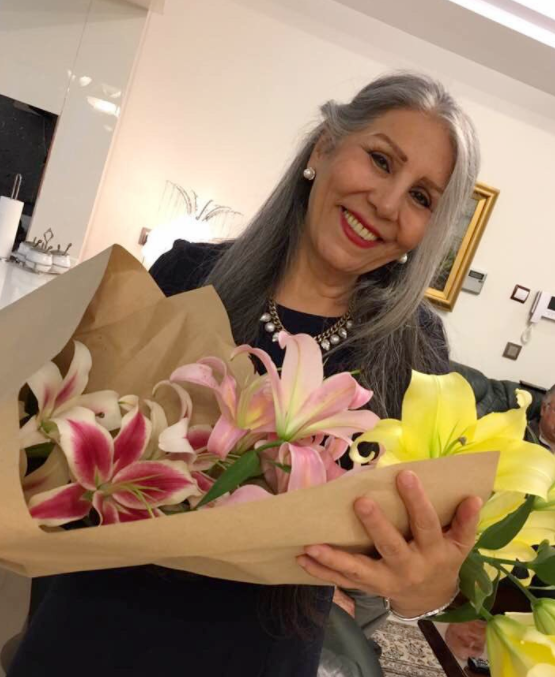Source: www.bic.org

GENEVA—18 September 2017—Mahvash Sabet, one of the seven members of the former leadership group of the Baha’is in Iran who were imprisoned due to religious beliefs, has been released after completing her unjust 10-year prison sentence.
Mrs. Sabet, 64, was the first member of the ad-hoc group – known as “the Yaran”, or the Friends – to be arrested in March 2008. The six others were arrested in May of the same year after an early morning raid in their homes. All seven were held incommunicado for weeks, subjected to solitary confinement, and suffered appalling treatment and deprivations, including psychological and physical hardships.
Some twenty months after being imprisoned without charge, their trial began on 12 January 2010 and ended five months later, on 14 June 2010, after six brief sessions, characterized by their lack of due legal process.
Following their first trial, their lawyer and Nobel Peace Prize winner, Ms. Shirin Ebadi, who had hardly one hour’s access to her defendants, explained that she had read the dossier of charges against them and found no proof to sustain their criminal charges.
“I am the head of the legal team representing these seven Baha’is. I have studied their files thoroughly,” said Ms. Ebadi. “There is not a shred of evidence for the charges leveled against them.”
Their arrest and imprisonment prompted an international outcry for their release by the United Nations (UN), governments and media around the world. In 2010, the UN High Commissioner for Human Rights, Ms. Navi Pillay, expressed “deep concern that” their “trials did not meet the requirements of due process and fair trial” and in a 2014 report by the UN Secretary-General Ban Ki-Moon, he urged “their unconditional release” from prison.
Today, the conclusion of the sentence of Mrs. Sabet takes place against the backdrop of increasing religious discrimination against the Baha’is in Iran.
“Although the news of the release of Ms. Sabet after the completion of her sentence is a welcome development, it does not signal the end of the persecution of the Baha’is in Iran,” said Ms. Bani Dugal, the Principal Representative of the Baha’i International Community to the United Nations in New York.
“The reality remains that, after 10 years, Mrs. Sabet is returning to a Baha’i community under increased pressure in many ways. In addition, Mrs. Sabet will naturally be awaiting the release of her six colleagues who continue to be unjustly imprisoned.”
In the past years, economic persecution against the Bahá’ís has escalated in what the Bahá’í International Community has called, in an open letter to President Hassan Rouhani, an “economic apartheid against a segment of Iran’s population”. Since 2013 alone hundreds of Bahá’í shops and businesses have been sealed, leaving scores of families without an income.
“Indeed, the trial and treatment of the seven members of the former Yaran reflects the treatment of the entire Baha’i community in Iran,” said Ms. Dugal. “Over what has been nearly 40 years, more than 220 Baha’is have been killed, hundreds imprisoned, and an entire community has been categorically excluded from public jobs and university education.”
The Yaran, now disbanded, were formed with the full knowledge and approval of the Iranian authorities after formal Baha’i institutions were declared illegal in Iran in the 1980s. Their role was to see to the minimum spiritual and material needs of Iran’s Baha’i community. Even so, the government imprisoned the seven and originally sentenced them to 20 years’ imprisonment. Their sentence was later reduced to 10 years, after a delayed application of the 2013 penal code to their case.
Mrs. Sabet, herself, suffered persecutions in her individual life. Prior to being expelled from her profession for being a Baha’i, she worked as a teacher and school principal and collaborated with the National Literacy Committee of Iran. Ironically, among the many developments she missed in the lives of her family members during her imprisonment, Mrs. Sabet was unable to celebrate her daughter’s academic achievements with family.
In prison, she continued to exercise her literary prowess, writing an anthology of poems that was later published and translated in the book, Prison Poems. Her work was recognized by Pen International.
“Although Mrs. Sabet is being freed from prison, she will still not achieve full freedom,” said Ms. Dugal. “She will return to a society where Baha’i youth are deprived of access to higher education and public jobs, where attacks on small Baha’i-owned shops are increasing, cemeteries are being desecrated, Baha’is are vilified in state sponsored media on a daily basis and where they are arbitrarily arrested and imprisoned for their beliefs.”
The six remaining members of the Yaran are also expected to complete their sentences in the coming months. They include, Mrs. Fariba Kamalabadi, 55; Mr. Jamalodin Khanjani, 83; Mr. Afif Naeimi, 55; Mr. Saeid Rezai, 59; Mr. Behrooz Tavakkoli, 65; and Mr. Vahid Tizfahm, 43.
“The worldwide Baha’i community, along with vast numbers of people in Iran and throughout the world, eagerly await the conclusion of the unjust sentence of the six other members of the Yaran,” said Ms. Dugal. “We hope that their release will start a new chapter for the treatment of the Baha’is in Iran and that the government will begin to remove the obstacles in its way to abide by the promise it has made of ‘creating justice for all Iranians equally’”.
Leave a Reply